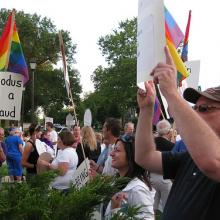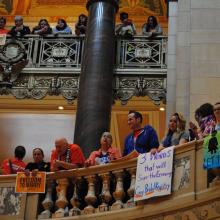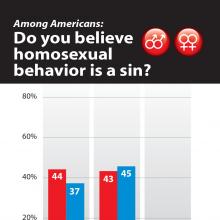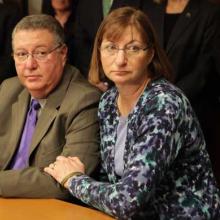Homosexuality
Sometimes a court opinion is more than just a court opinion.
Justice Anthony Kennedy’s 26-page decision Wednesday striking down a federal ban on same-sex marriages offers a window into Americans’ rapidly shifting views of same-sex relationships — a shift that increasingly relies on matters of law and fairness, not moral or religious views.
At the same time, Justice Antonin Scalia’s biting 26-page dissent in United States v. Windsor reflects a set of cultural, religious, and social arguments that are losing ground in the court of public opinion and now, in the highest court of the land.
For more than a generation, the gay conversion organization known as Exodus International has been one of the most prominent Christian symbols of LGBT intolerance. They have practiced what is commonly called “reparative therapy” to supposedly remove the urges of same-sex attraction from those who seek to become straight. I have personally written at great length about the damage done by such religiously fueled zealotry, but never in my lifetime did I anticipate that the leader of this infamous anti-gay organization would concede as much to the public in the form of a confession.
What’s more, at their 38th annual convention, Exodus International’s director, Alan Chambers, announced plans to close the organization and cease its mission for good. You can read Mr. Chambers’ full of apology HERE, as well as the formal closure announcement HERE.
I’m not prone to emotional hyperbole, but I read these announcements and confessions with a nearly overwhelming admixture of shock, disbelief, compassion, and hope. I also try not to fill my blog posts with too much content from other sources, but this is one of those occasions when the original source material should be seen without adaptation. Following are several excerpts for Mr. Chambers’ open apology to the public, along with my thoughts:
Exodus International, a group that bills itself as “the oldest and largest Christian ministry dealing with faith and homosexuality,” announced late Wednesday that it’s shutting its doors.
Exodus’s board unanimously agreed to close the ministry and begin a separate one, though details about the new ministry were unavailable at the time of the organization’s press release.
The announcement came just after Exodus president Alan Chambers released a statement apologizing to the gay community for many actions, including the organization’s promotion of efforts to change a person’s sexual orientation.
For the Rev. Ernest Easley, the decision to cut ties with the Boy Scouts was simple.
The Bible says homosexuality is a sin. The Boy Scouts do not.
“We are not willing to compromise God’s word,” said Easley, pastor of the 2,300-member Roswell Street Baptist Church in Marietta, Ga., which has sponsored Boy Scout Troop 204 since 1945.
On the campus of the University of Missouri-St. Louis, the Rev. Gary Meier addressed a congregation of sorts — people who wanted to hear what the Roman Catholic priest had been thinking since, nearly a year ago, he last stood before a flock.
That was last June, when Meier told his parishioners at Saints Teresa and Bridget Church in north St. Louis that he would take a leave of absence “to discern what ministry God was calling me to do.”
Meier, 49, had told his archbishop that he could no longer teach the Catholic church’s stance on homosexuality.
“I have tried over the years to reconcile my silence as a gay priest with that of the Church’s increasingly anti-gay stance. I have been unsuccessful,” Meier writes in his book “Hidden Voices: Reflections of a Gay, Catholic Priest.”
Twenty years ago, a gay Mormon character stepped onstage for the first time. His name was Joe Pitt, and he was in Tony Kushner’s Angels in America, Part One: Millennium Approaches.
Pitt lived in New York with a good reputation and a bad marriage to a woman addicted to Valium. As colleagues dealt with the devastation and uncertainty of AIDS — it was the 1980s — he grappled with openly acknowledging his sexuality. He was Mormon. And gay. And the two didn’t mix.
Before Pitt, there was a gay Mormon character in a novel: Brigham Anderson, in Allan Drury’s Advise and Consent, published in 1959. But words like “gay” and “homosexual” weren’t used; it was all innuendo.
Now, the scene has changed: Gay Mormon characters and themes have a growing role in theater and literature.
A tipping point has been reached, not only on the issue of marriage equality, but on the broader political force of bully Christianity, a pernicious brand of the faith that tells people who don't have conservative social and political views that they "aren't Christian." That model has now failed where it used to work reliably; Waterloo has been reached.
To be clear, not all of those who sought to protect traditional man-woman marriage were bullies. Many acted out of a principled and consistent sense of their own faith, and stayed away from defining the faith identity of others. I am fortunate that the same-sex marriage opponents I know best avoided that tactic and amid our disagreement never suggested that I was no longer a part of the diverse and complex body of Christians.
Still, it is undeniable that many advocates for traditional marriage actively used the bullying tactic of asserting that there was only one "Christian" position on this issue, and that the Christian viewpoint rejected marriage equality. Unfortunately, their voices have too often been the loudest, and the ones to which the press is most attracted. That tactic has now been exposed as something worse than unprincipled, politically: It has been shown to be ineffective in the public arena.
Some will see this tipping point as a huge loss for Christianity, but it might instead be the faith's salvation. Bullying was always a terrible form of evangelism.
They have pledges. They have merit badges. And they may go camping.
But they’re not the Boy Scouts.
Across the country, there are decades-old religious alternatives with names like Pathfinders (Seventh-day Adventist), Royal Ambassadors (Southern Baptist), and Royal Rangers (Assemblies of God).
And as the Boy Scouts of America considers whether to change its membership policy to admit gay members (but continue its ban on gay leaders), some of these groups are fielding inquiries from people concerned about the action the BSA may take.
Just because the nation may change its laws to “tolerate legalized acts of immorality” does not make those acts any less spiritually damaging, senior Mormon apostle Boyd K. Packer said on Saturday at the Church of Jesus Christ of Latter-day Saints’ 183rd Annual General Conference.
“The permissiveness afforded by the weakening of the laws of the land to tolerate legalized acts of immorality,” Packer said, “does not reduce the serious spiritual consequences that result from the violation of God’s law of chastity.”
Packer, president of the Mormons’ Quorum of Twelve Apostles and next in line to take over the church’s reins, didn’t specifically mention gay marriage, but his comments came amid controversy on the issue nationwide and a significant swing in public and political opinion toward favoring such same-sex unions.
In nearly two hours of arguments on Wednesday, the Supreme Court heard many of the expected cases for and against recognizing gay marriage: that refusing to do so is blatant discrimination, that gay marriage is a social experiment that the court should not preempt, that Washington has no role in state marriage laws.
Yet it was arcane arguments over matters of legal standing that seemed to most animate the justices, reflecting what seemed to be a desire to find a way for the court to sidestep a definitive up-or-down ruling on one of the most divisive social issues.
In short, the court — particularly its conservative majority — seemed to ask why they should hear a second gay marriage case in as many days, particularly one in which the government supports the lower court’s ruling. And the answer to that question will go a long way toward determining the outcome of a spirited national debate.
Isn’t it remarkable, attorney Ted Olson said after arguing for same-sex marriage before the Supreme Court on Tuesday, that the other side wasn’t really arguing against it?
“No one really offered a defense,” he said of his opponents’ bid to uphold Proposition 8, the 2008 California referendum that effectively ended gay marriage in the state by defining marriage as between a man and a woman.
The question inside the courtroom was not so much can there be gay marriage, but “how do you establish marriage equality?” said David Boies, another attorney for Prop 8 opponents.
Indeed, the lawyer trying to prop up Prop. 8, which was struck down by federal trial and appeals courts, spent barely any time talking about the virtues of traditional man-woman marriage or the hazards of same-sex marriage.
And that, for supporters of gay marriage, shows just how far this debate has come in the U.S.: It’s no longer “if” it will be accepted and legal, but “how” and “when.”
Bio: Executive director of Sexual Minorities Uganda, which works for full legal and social equality in the country, and recipient of the 2011 Robert F. Kennedy Human Rights Award. www.sexualminoritiesuganda.net
1. What’s your response to the letter U.S. religious leaders signed last year, which condemned the “Anti-Homosexuality Bill” before Uganda’s Parliament because it “would forcefully push lesbian, gay, bisexual, and transgender (LGBT) people further into the margins”?
Uganda is a very Christian country. About 85 percent of our population is Christian—Anglican, Catholic, and Pentecostal. So for religious leaders to speak out against the Ugandan legislation, that is very important for me and for my colleagues in Uganda, because it speaks not only to the politicians and legislators, but also to the minds of the ordinary citizens.
It is very important to have respected religious leaders involved, including Archbishop Desmond Tutu, because these are leaders who have spoken out on other human rights issues such as apartheid, women’s rights, and slavery. And for us, for the voice of LGBT rights, to join with these other issues clearly indicates that our movement is fighting for human rights.
Americans’ acceptance of gays and lesbians is continuing to grow, with a new poll showing that just over a third of Americans view homosexuality as a sin, down from 44 percent a year earlier.
The finding from LifeWay Research, which was founded by the Southern Baptist Convention, was released just as the pastor who was to give the inaugural benediction for President Barack Obama withdrew from the program over an anti-gay sermon he gave 20 years ago.
The evangelical pastor that President Obama picked to deliver the benediction at his inauguration ceremonies withdrew from the high-profile assignment on Thursday following a furor over a sermon from the mid-1990s in which he denounced the gay rights movement and advocated efforts to turn gays straight.
In a statement, the Rev. Louie Giglio of Atlanta, founder of the Passion Conferences for college-age Christians, did not directly renounce his remarks on gays but indicated that fighting gay rights is not one of his “priorities.”
Still, because of the controversy – which erupted on Wednesday after the liberal group Think Progress posted audio of the sermon – Giglio said that “it is likely that my participation, and the prayer I would offer, will be dwarfed by those seeking to make their agenda the focal point of the inauguration.”
SALT LAKE CITY—The Church of Jesus Christ of Latter-day Saints isn't changing its tune about homosexuality, but it has launched a new website to alter the tone.
The site — unveiled on Dec. 6 and called “Love One Another: A Discussion on Same-Sex Attraction” — includes video clips of Mormon leaders as well as gay members and their families promoting compassion and understanding toward homosexuals, and encouraging everyone to be “disciples of Christ.”
“Our hope with this site is that empathy will grow in families,” LDS apostle D. Todd Christofferson says in one clip. “We’re trying to communicate that our love is inclusive, that we want to have the family remain intact, and the relationships we’ve treasured over the years to remain and to grow.”
It’s important, the apostle says, “to recognize the feelings of a person, that they are real, that they are authentic, that we don’t deny that someone feels a certain way.”
Many gay rights activists, inside and outside the LDS church, applaud Mormonism’s latest effort.
NAIROBI, Kenya — Nobel Laureate Archbishop Desmond Tutu on Tuesday urged Uganda to scrap a controversial draft law that would send gays and lesbians to jail and, some say, put them at risk of the death penalty.
The Anti-Homosexuality Bill is expected to become law after Parliamentary Speaker Rebecca Kadaga offered it to Ugandans as a "Christmas gift." The bill is believed to exclude the death penalty clause after international pressure forced its removal, but gay rights activists say much of it is still horrendous.
“I am opposed to discrimination, that is unfair discrimination, and would that I could persuade legislators in Uganda to drop their draft legislation, because I think it is totally unjust,” Tutu told reporters here on Tuesday at the All Africa Conference of Churches meeting.
The Ugandan Parliament has re-introduced a draconian anti-LGBT bill that has received widespread international criticism. Under this bill, first introduced in 2011 and re-introduced earlier this year, the government would prescribe the death penalty to all LGBT people and those that provide them with housing and resources.
The bill is expected to pass before the end of this year; its champions call it a “Christmas gift to the Ugandan people.”
In the face of this hatred, I am glad to work for Sojourners, which earlier this year signed on to the following statement along with other Christian groups:
Our Christian faith recognizes that all human beings have been created in the image and likeness of God, and Christ teaches that we are to love our neighbors as ourselves. All acts of bigotry and hatred betray these foundational truths … Regardless of the diverse theological views of our religious traditions regarding the morality of homosexuality, the criminalization of homosexuality, along with the violence and discrimination against LGBT people that inevitably follows, is incompatible with the teachings of our faith.
RIDGEWOOD, N.J. — The parents of Tyler Clementi have left their longtime evangelical church due to its views on homosexuality.
Jane and Joe Clementi told The New York Times that they had grown increasingly out of step with the Grace Church, a nondenominational evangelical church in Ridgewood, N.J., due to its casting of homsexuality as sinful.
Tyler Clementi committed suicide by jumping off the George Washington Bridge in 2010. His death came just days after his roommate, Dharun Ravi, had spied on him during a tryst with another man in their freshman dormitory at Rutgers University.
Ravi was convicted of 15 charges, including invasion of privacy and bias intimidation, in March. He was sentenced to 30 days in jail, of which he served 20.
The case garnered national attention from the media, as well as gay rights and anti-bullying activists. Clementi had come out to his parents just days before he left for college, and numerous news outlets reported that he had left feeling rejected. According to the Times, Tyler told his mother that he did not believe he could be Christian and gay.
This week, I and many U.S. Christian leaders signed on to a letter, concerning a re-introduced version of Uganda’s Anti-Homosexuality Bill, a bill which perpetuates some alarming and hateful language about the LGBT community in Uganda, and indeed, around the world. When it was originally introduced in 2009, it made homosexuality an act punishable by death. While the most draconian measures have been removed, the bill still calls for life imprisonment for people who are homosexual, and makes even discussions about sexual orientation illegal, stifling any opportunity to build a civil and constructive dialogue. How can we expect to come together to bridge the divides if we cannot even bring ourselves to sit down together and talk? What is even more heartbreaking, so surprising, is that Christian leaders in Uganda continue to support it.
What are we calling for in this letter? It is a simple message, and one that all who profess a Christian faith should be able to agree with:
All human beings have been created in the image and likeness of God, and Christ teaches that we are to love our neighbors as ourselves. All acts of bigotry and hatred betray these foundational truths.
Thousands of people wearing red shirts gathered in downtown Columbia, Mo., July 21 to honor an Army solider killed recently in Afghanistan—and to fend off Westboro Baptist Church.
The controversial church, based in Topeka, Kan., had posted fliers around Columbia in advance of the funeral of Army Spc. Sterling Wyatt, who was killed July 11 by an improvised explosive device.
“These soldiers are dying for the homosexual and other sins of America. God is now America’s enemy, and God Himself is fighting against America," the posters read. "THANK GOD FOR IEDs.”
















